(All identities are composites of multiple cases or identifying information has been obscured)
Contents:
The Court-Involved Therapist (CIT)
Case 1
What did this CIT do wrong?
Forensic and Therapeutic Role conflict
Psychotherapy and High Conflict Divorce
A forensically informed therapist
Case 2
Guidelines for Court-Involved Therapists
Child Therapists in Court-Involved Cases
Role Boundaries for the CIT
Guidelines and Standards
Case 3
A Continuum of Divorce Conflict
“Caught In the Middle“
Case 4
Special consideration for CIT roles with children
Case 5
Ethical Decision Making
Child Custody Evaluations
Treating a child or family involved with the court, e.g., via divorce or custody/parenting-time conflict and litigation, creates unique ethical dilemmas and pitfalls for the treating psychologist.
Examples which highlight these issues for the treating therapist are reviewed as an aide to avoiding legal and ethical risks for psychologist and as an aide to attorneys and families.
The Court Involved Therapist
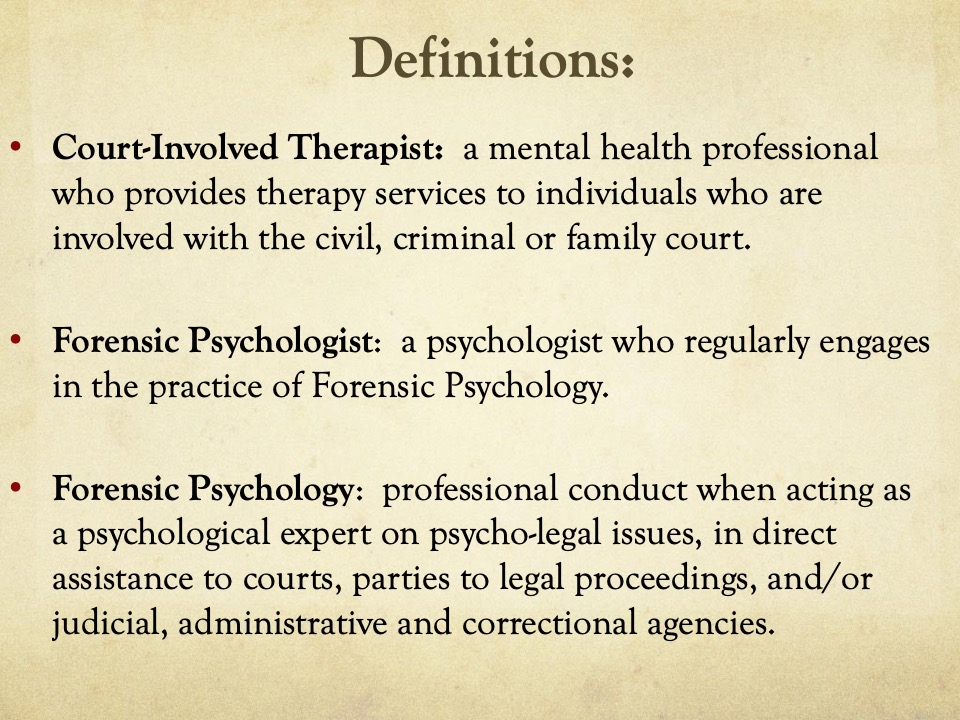
Definitions
A court-involved therapist (CIT) is a mental health professional who provides therapy services to children, adults, or families who are involved, or become involved during the course of treatment, with the civil, criminal or family court.
• The patient may enter treatment before any court involvement, seek therapy during their legal case, or may be ordered by the court into treatment.
• The CIT must distinguish between issues on which he or she can be helpful, and psycho-legal issues or requests which are beyond, or conflict with the expertise, role and ethical obligations of a treating therapist.
A “Forensic psychologist” is a psychologist who regularly engages in the practice of forensic psychology.
“Forensic psychology” means all forms of professional conduct when acting, with definable foreknowledge, as a psychological expert on explicitly psycho-legal issues, in direct assistance to courts, parties to legal proceedings, correctional and forensic mental health facilities, and administrative, judicial and legislative agencies acting in an adjudicative capacity.
A Forensically- Informed Therapist
Psychologists who are not forensic psychologists, but who occasionally provide limited forensic psychological services, such as a treating expert who provides expert testimony on their patient, or who is asked to offer expert opinion on their patients or family members of their patients may find this workshop useful in ethical decision-making.
• You might decide to get some serious continuing education and take on a practice as a forensic psychologist as an evaluator, a mediator, a parenting coordinator, an expert.
Or you can become a forensically-informed therapist in order to effectively manage requests and opportunities to become involved with the court.
• A psychologist really can’t completely avoid dealing with the Court, even if you try:
• An adult, child, marital or family therapist inevitably has patients who are involved in contested child custody, parenting time or other family court disputes.
•If you are a child therapist, you will receive requests to write letters to the family court, to speak with a custody evaluator, or to testify at a hearing in front of a judge or referee.
• If you are an adolescent therapist, you will see a teenager who has gotten in trouble with the law, or whose parents will want you to help that teen in some other way involving the courts. That patient may become involved in his parent’s custody or parenting time dispute, for example, by asking for a change in the schedule.
•You will, at some point, receive a request to write a letter, or a subpoena to testify on behalf of a patient, or to provide your records to an attorney.
•These psycho-legal interactions can create opportunities to be helpful. They also introduce risk: of ethical problems, of licensing complaints, of lawsuits .
Case 1:
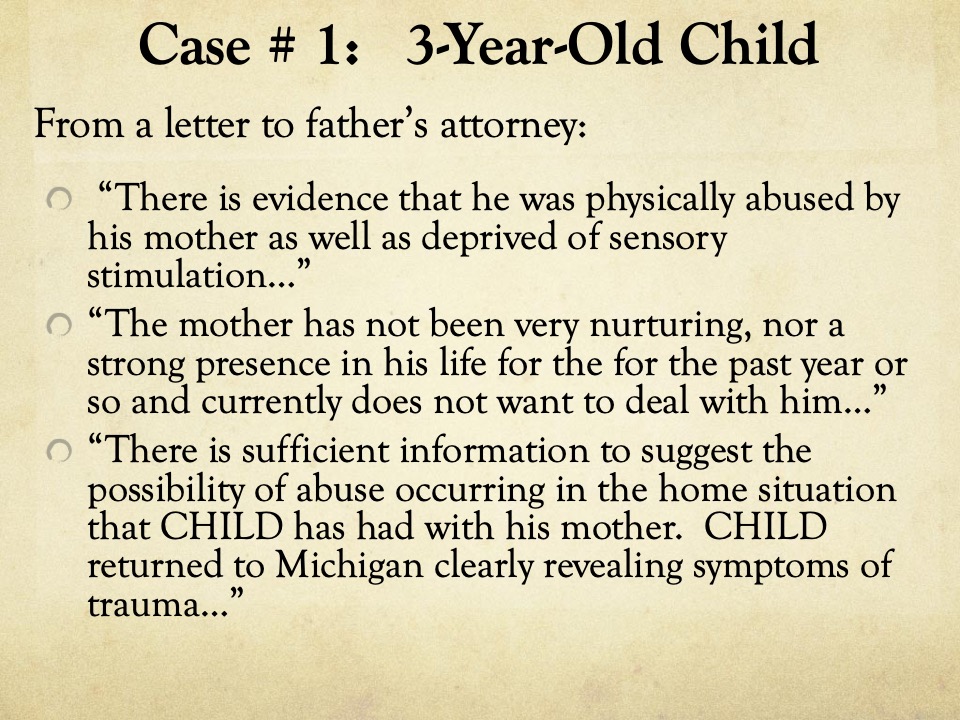
A disturbing example: (I have altered the facts to protect the identity of the psychologist and the family):
• A father comes to the office of a psychologist, to whom he is referred by his attorney. He brings his three-year-old son. The boy’s parents recently divorced,. There was a custody dispute in another state- temporary custody of child went to mother, who has 2/3 of the year with the child.
• Father reports that the boy cries whenever he has to return to his mother, has sleeping difficulties when he first comes to dad, seems fearful and reluctant to communicate with dad or dad’s parents for days after he arrives in Michigan.
• Father reports that the child has complained about mom’s new boyfriend.
• Observed with father, the child seems anxious and insecure– the child tells the psychologist that he hates the boyfriend, but does not give specifics.
According to dad and grandfather, the child told them that mother’s boyfriend hit him, kissed his body, lay down with him, and that he took a nap with mom and her boyfriend; the boy did not say this to the psychologist.
• Dad says he suspects that the boy is being abused either by mom or her boyfriend, and that mom is telling the child negative things about him to alienate the child from him.
• The psychologist is sympathetic to the dad, who seems to be legitimately concerned about his son.
• The boy was not speaking clearly and was not potty trained. He would follow directions only when he was interested in doing do. He would point his finger and say “bad boy.” He would run to the door and cry when his father left him in the office with the psychologist. He would cry when he wanted to be picked up.
The psychologist offered to do therapy for the child and to write a letter to the judge. The mother was not contacted nor seen.
• The psychologist saids in the letter that an evaluation needs to be done, and that until this is done, the child should not return to mom. This is what the psychologist wrote in a letter to dad’s attorney:
•“There is evidence that he was physically abused by his mother as well as deprived of sensory stimulation…”
– The psychologist concluded that the child likely had been abused, locked up, and deprived of food and sensory stimulation.
•“The mother has not been very nurturing, nor a strong presence in his life for the for the past year or so and currently does not want to deal with him…”
•“There is sufficient information to suggest the possibility of abuse occurring in the home situation that CHILD has had with his mother. CHILD returned to Michigan clearly revealing symptoms of trauma…”
None of these conclusions made sense to several psychologists who reviewed this case.
• Again, the mother had neither been contacted nor seen.
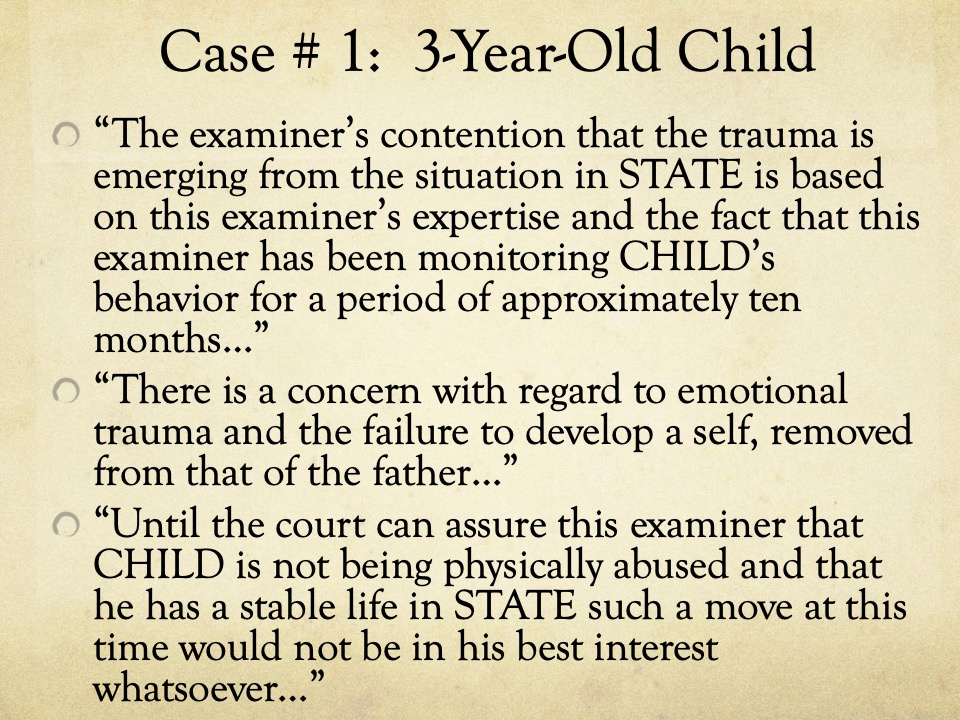
Here are excepts from the psychologist’s letter. Again, none of these conclusions are supported by reliable, generally-accepted evidence, data or logic.
But based on this letter, Mom’s STATE court temporarily altered the custody arrangement to alternating three-month periods [in itself an awful parenting time arrangement for such a young child].
After returning to dad from mom’s home in STATE the boy was quiet and withdrawn, which [questionably] suggested “trauma” to the psychologist. The psychologist described an episode of what looked to him like “dissociation,” which is what happens after PTSD: his father was holding the child, and he seemed to not want to be held, then slumped over with no facial expression.
The STATE court ordered the child’s mother to be examined by the psychologist when she came to Michigan to pick up her son. Mother testified that she arrived at 7 in the evening and was seen until midnight at the psychologist’s office. She also claimed the child’s father was in the room throughout the psychologist’s meeting with her. The psychologist denied that either thing happened. Then mom was given a series of personality tests (MMPI, etc.).
The psychologist wrote a report, but the court in STATE, at this point, was no longer listening to this psychologist. The old parenting time arrangement was restored.A complaint was filed with the Board of Psychology which led to sanctions against the psychologist.
What did this CIT (court-involved therapist) do wrong?
A Partial list of sections of the Ethics Code of the American Psychological Association, which I believe were violated by this psychologist, are:
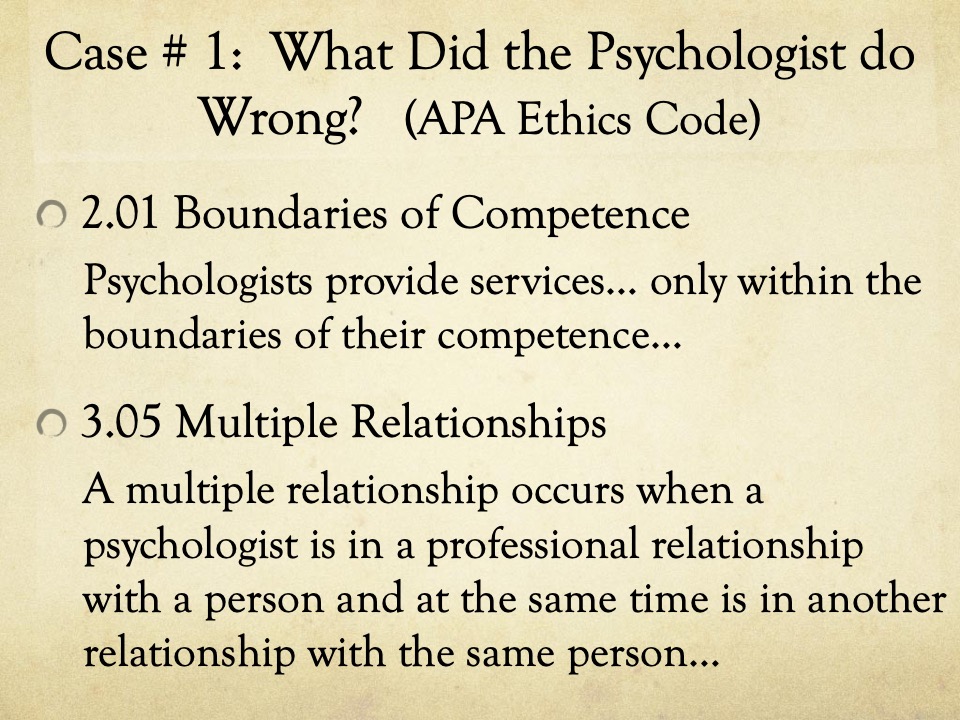
2.01 Boundaries of Competence
Psychologists provide services, teach, and conduct research with populations and in areas only within the boundaries of their competence, based on their education, training, supervised experience, consultation, study, or professional experience …
The CIT/psychologist had no training or experience in child custody evaluation, and incidentally no training in ethics- he got his degree before ethics courses were a requirement, and had never been to an ethics workshop prior to the complaint.
3.05 Multiple Relationships
A multiple relationship occurs when a psychologist is in a professional relationship with a person and at the same time is in another relationship with the same person. A multiple relationship is unethical when it can reasonably be expected to impair the psychologist’s objectivity, competence or effectiveness … or otherwise risk exploitation or harm to the person with whom the professional relationship exists.
This psychologist placed himself in roles both as a treater for the child and as a forensic expert, rendering opinions in a parenting time and custody dispute.
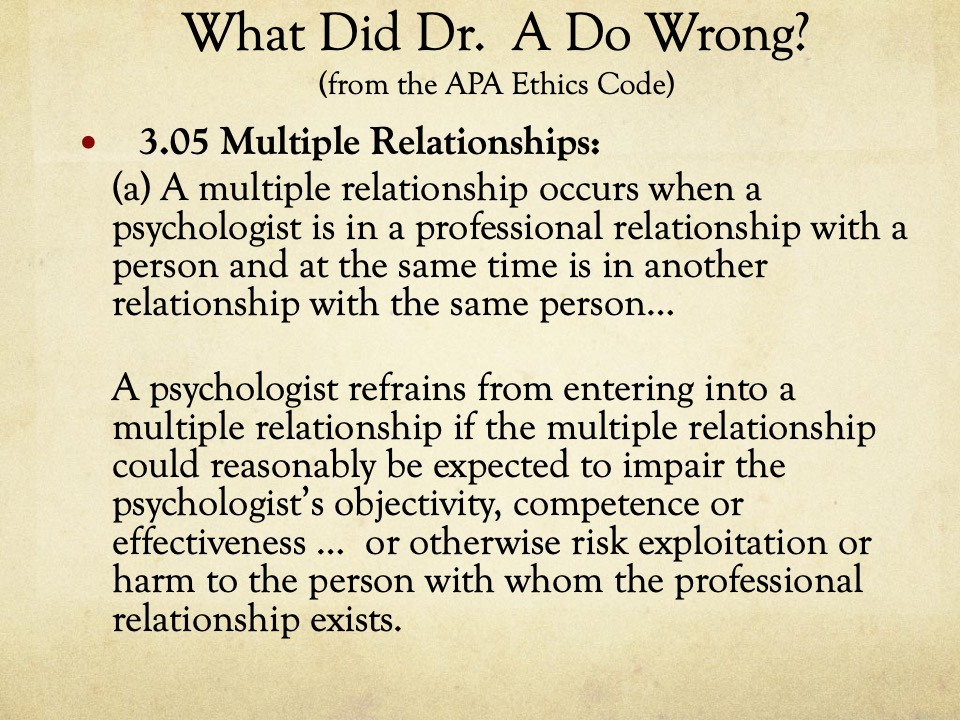
Multiple relationships that would not reasonably be expected to cause impairment or risk exploitation or harm are not unethical.
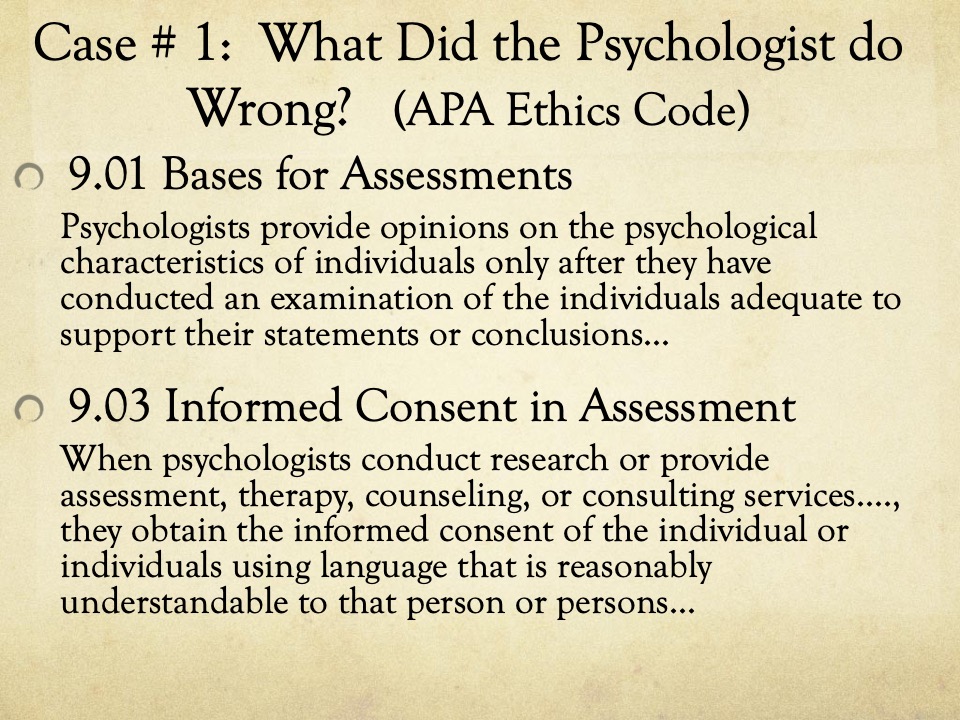
9.01 Bases for Assessments
“(b)…psychologists provide opinions on the psychological characteristics of individuals only after they have conducted an examination of the individuals adequate to support their statements or conclusions…”
Clearly, the CIT’s statements about the mother are not based on any examination at first, and by a highly irregular examination later.
- The CIT says there was “evidence that he was physically abused by his mother…The mother has not been very nurturing… There is sufficient information to suggest the possibility of abuse occurring in the home situation that CHILD has had with his mother”
- Statements like: “There is a concern with regard to emotional trauma and the failure to develop a self, removed from that of the father…” along with the other statements, raise a distinct issue of bias, and lack of objectivity and integrity.
- There is clear potential for harm, to the mother, and to the child.
9.03 Informed Consent in Assessment
As father had joint legal custody, several experts testified that he could take the child to the CIT for evaluation and treatment; however, according to the mom’s testimony, the psychologist never explained to the mother the purpose or goal for her evaluation; Mom was simply told that she had to meet the psychologist to get her child. She never consented to a forensic examination.